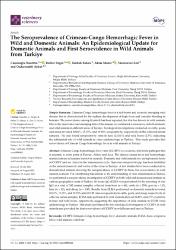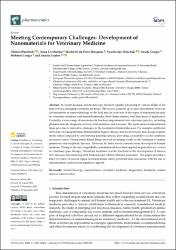Search
Now showing items 1-7 of 7
Determination of biologically active phenolic compounds in propolis by LC-MS/MS according to seasons and altitudes
(Springer, 2019)
The present study aimed to determine the effect of season and altitude to amount and prevalence of phenolic compounds in propolis. For the aim, 174 propolis samples were collected from 58 stationary apiaries from altitudes ...
Seasonal and Age-Associated Pathogen Distribution in Newborn Calves with Diarrhea Admitted to ICU
(MDPI, 2021)
Calf mortality constitutes a substantial loss for agriculture economy-based countries and is also a significant herd problem in developed countries. However, the occurrence and frequency of responsible gastro-intestinal ...
Meta-analysis and comprehensive study of coronavirus outbreaks:SARS, MERS and COVID-19
(Elsevier, 2021)
Background: Zoonotic coronaviruses have caused several endemic and pandemic situations around the world. SARS caused the first epidemic alert at the beginning of this century, followed by MERS. COVID-19 appeared to be ...
Characterization of commercially available propolis products in Turkey based on individual phenolic compounds
(Taylor & Francis Inc., 2021)
The healing properties of propolis, such as antibacterial, antiviral, antifungal, anti-inflammatory, antitumoral, antioxidant, immunomodulatory, tissue regeneration, and anti-ulcer, are due to the high content of phenolic ...
Development of a protective inactivated vaccine against Crimean-Congo hemorrhagic fever infection
(scienceDirect, 2021)
Crimean-Congo hemorrhagic fever (CCHF) is an emerging zoonotic infectious disease caused by Crimean-Congo hemorrhagic fever virus (CCHFV). The first clinical CCHF infection was described in 1944 in the Crimean Peninsula, ...
The Seroprevalence of Crimean-Congo Hemorrhagic Fever in Wild and Domestic Animals: An Epidemiological Update for Domestic Animals and First Seroevidence in Wild Animals from Turkiye
(MDPI, 2022)
Crimean-Congo hemorrhagic fever virus (CCHFV) is a zoonotic, tick-borne pathogen that is endemic to some parts of Europe, Africa, and Asia. The disease causes fever and hemorrhagic manifestations in humans but not in ...
Meeting Contemporary Challenges: Development of Nanomaterials for Veterinary Medicine
(MDPI, 2023)
In recent decades, nanotechnology has been rapidly advancing in various fields of human activity, including veterinary medicine. The review presents up-to-date information on recent advancements in nanotechnology in the ...





















